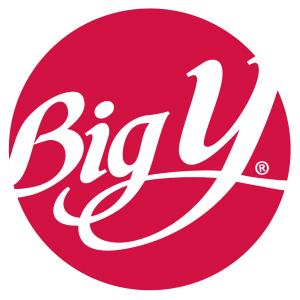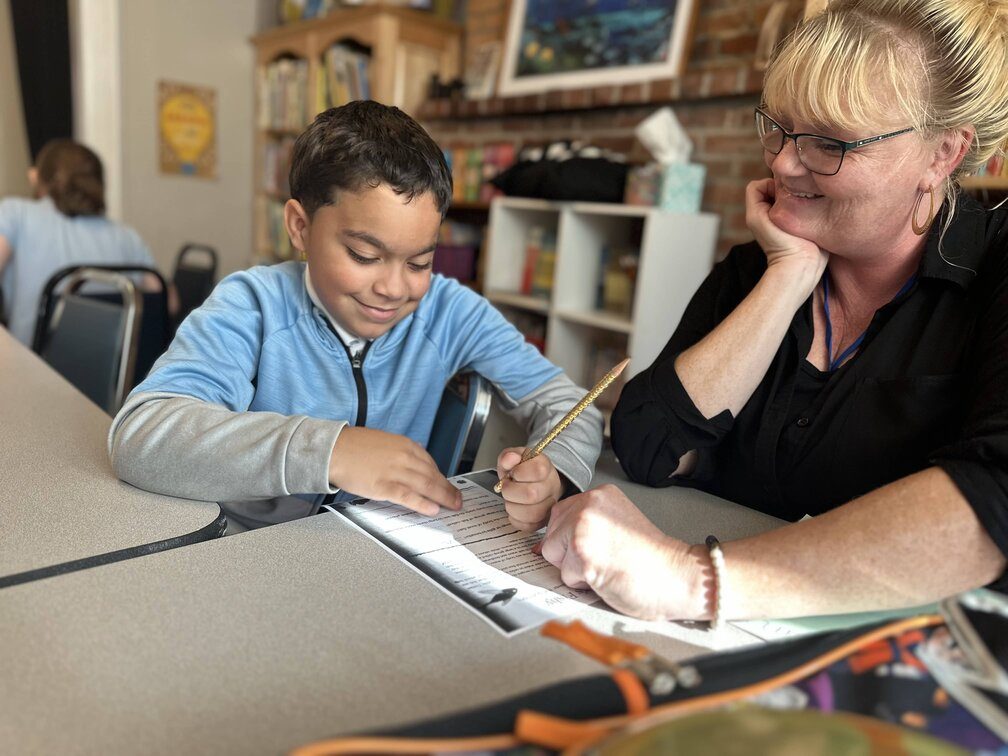For almost 40 years, The Gray House has provided food, clothing and education services to its neighbors in need. Making room for hope and kindness in every day and treating everyone with dignity and respect are the cornerstones of this organization. Big Y has supported The Gray House through its Community Bag Program.
Tell us about The Gray House.
The mission of The Gray House is to help our neighbors facing hardships to meet their immediate and transitional needs. We do that by providing food, clothing and education services in a safe, positive environment in the north end of Springfield, Massachusetts.
A group of Sisters of St. Joseph started the agency. They had moved to the north end of Springfield and saw the poverty and violence that was so much a part of the neighborhood at the time, and they wanted to create a safe space. Their founding belief was to create a place where peace is lived and learned, and hope is shared. And they wanted to be able to provide services that met the civic, social and educational needs of those neighbors.
So, in 1982, they purchased this fire-damaged, tax-delinquent, gray Victorian house at a public auction for $500. Then, with hundreds of volunteers, contractors donating their time and people coming in off the street to grab a hammer and do whatever they could, they renovated the building. They opened the doors in 1984, which is when we started offering services.
Their founding belief was to create a place where peace is lived and learned, and hope is shared. And they wanted to be able to provide services that met the civic, social and educational needs of those neighbors.
What services do you provide to the community?
We have three main programs, all of which aim to help our neighbors break the cycle of poverty. First, we have The Market, which provides equitable access to groceries, including meat, produce, dairy and nonperishables, to households facing food insecurity. That’s definitely our largest footprint program.
Our Adult Education program helps low-income migrants and refugees improve their English language skills. The program also incorporates life skills focused on helping them to better understand the resources available to them and have the confidence to advocate for themselves and their families, improving employment opportunities.
We see people who have zero English to people who are a little bit familiar with it to people who didn’t even learn to read in their native language. So, it’s very individualized one-on-one tutoring for those students.
And then our Kids Club program provides after-school and summer programming for children in grades two through five from low-income families in Springfield. The program focuses on helping them with their homework during the school year. The summer program does a lot of literacy development, helping them combat summer learning loss. There are field trips, giving them new experiences that they might not otherwise have, and we help them build self-confidence and the skills they need to be successful in the future.
In addition to those three programs, we have a number of other distributions. For example, right now, we have our Thanksgiving food distribution going on. Usually, over 850 families get a turkey and all of the fixings they can make at home on Thanksgiving. Another example is our Christmas wish list program, which we coordinate with the schools, shelters and the children in our program to get their actual wish lists. We’ll give those out to donors so they can go buy gifts for specific kids. When they receive the items they asked for, it makes them feel special and loved. We have a couple of departments at Big Y that very generously sponsor several kids every year.
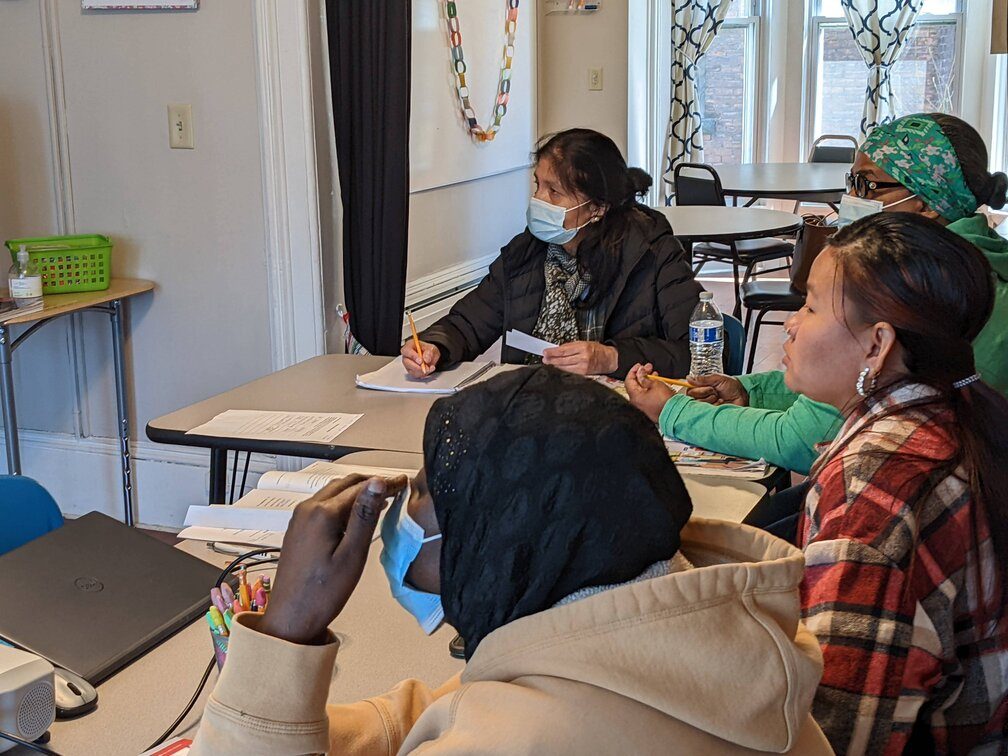
What sets you apart from other nonprofits in your community?
I think the main thing is our environment. We are in a gray, Victorian house, and we’ve definitely maintained that homey feel. For a long time, the Sisters were living on the second and third floors, and they would come down and see the kids. Although they no longer reside here, they’re still very much a part of The Gray House.
Tell us a story that illustrates the good work you are doing.
We have so many stories, but one really sticks out in my mind. One Thanksgiving, we were doing our drive, and a woman pulled up with her car full of boxes and boxes of stuffing she had just purchased.
I asked her how she heard of The Gray House, and she told me her story. Years ago, she had come to The Gray House when she was at a really low point in her life. She was a single mom. She had been barely eating because she wanted to make sure that her kids had enough food. But at one point, they literally had no food left in the house, and that’s when she knew she had to ask for help, even though she really did not want to.
She was embarrassed. There are a lot of stigmas associated with food assistance or any assistance. She was really trying to avoid asking for help but realized that for her children’s safety and health, she could no longer avoid that. So she came to The Gray House, and they set her up with enough food to fill her pantry, fill her fridge and told her to come back whenever she needed it. And most important, just encouraged her to let her know she would get through this time. She said the food was obviously extremely helpful, but just meeting the people at The Gray House and knowing that she had some sort of safety net that she didn’t think she had made all the difference.
And she did wind up coming back and using those services again but eventually got out of that situation. She was in a much better place when she came to donate and just wanted to give back and help other families that were maybe struggling as she did.
Obviously, the material things we provide are really important to people, especially if it means keeping the lights on and their family fed. But having that sense of hope and knowing that there are people that have your back when you need it is one of the most important things we can provide as an agency. Just making sure that we take the time to talk to all those who come through our doors…that kind of emotional support and comfort are critical.
But having that sense of hope and knowing that there are people that have your back when you need it is one of the most important things we can provide as an agency.
What is your most outstanding achievement or contribution to the community?
The way that our team responded at the start of the pandemic and then sustained that level of service is probably one of our greatest accomplishments.
I think back to the pandemic’s start and just how insane everything was. Everything was changing so quickly; there was so much uncertainty. Our team of staff, volunteers and supporters just rallied together. We had less than three-days’ notice to go from a food distribution where everybody needed to come through the back of our building into a pretty small space to a contactless, curbside process. It worked out really well, and we figured this was going to be the process for the next two or three weeks. Now, it’s almost three years later, and we’re still doing it. But it was actually a huge blessing in disguise.
The process we transitioned to was much more efficient and convenient for our staff and the people we were serving. We served an average of about 1,600 individuals per month before the pandemic. After we changed to curbside, the average we’ve served since 2020 is more than 4,700 per month. It’s been a blessing because we’ve been able to meet the incredible demand that’s come out of the pandemic.
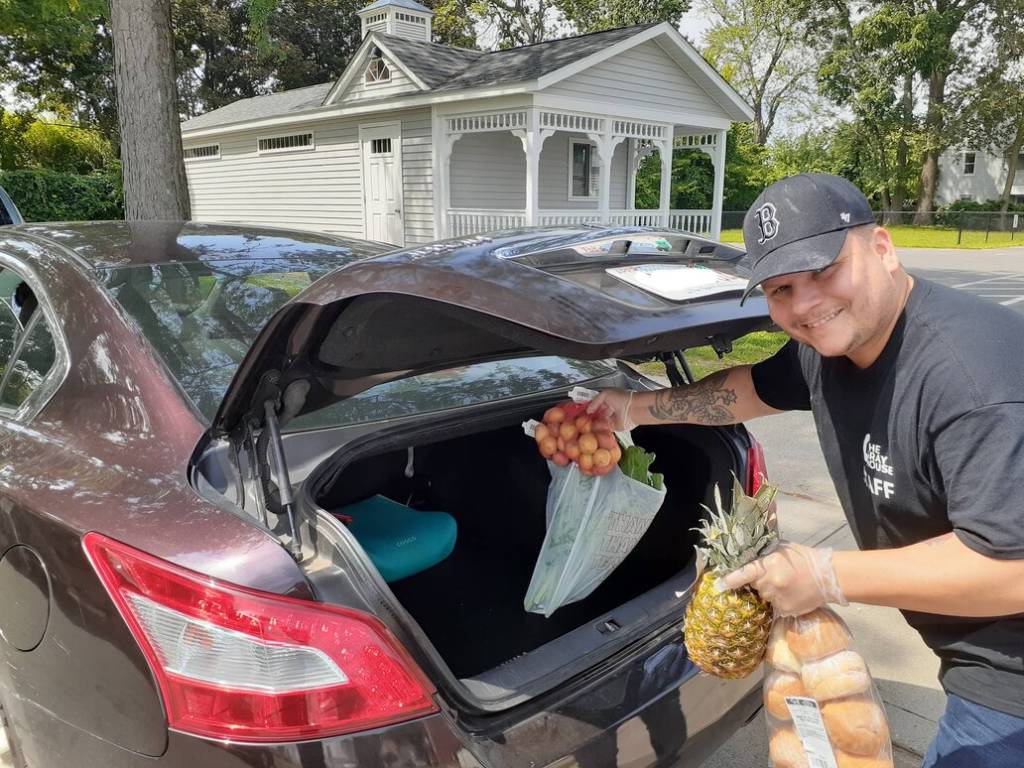
What do you want people to know about The Gray House?
We are such a small, grassroots organization, small in terms of our staff and our budget, but we do have such a huge impact through the community, as you can see from the numbers of people served through The Market.
But then the depth of the impact we have with the people we serve through Kids’ Club and the Adult Education program, I think, reflects the Sisters’ founding belief that The Gray House should be a place where peace is lived and learned, and hope is shared. That’s something that we take to heart in everything that we do. I think the people that we serve really see that, and the people in our community know that. Making room for hope and kindness in every day and treating everyone with dignity and respect are really the cornerstones of our organization.
How are you using the funds you’ve received from the Big Y Community Bag Program?
Fortunately, these funds are unrestricted within our Market program, so we will use them to help cover our Market operating costs, such as keeping the lights on and the refrigeration units running that we use to store the food.
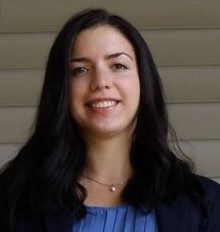
Teresa Liberti is Grants and Strategy Manager for The Gray House. She served as Executive Director for the agency from 2016 to 2020.
Published November 28, 2022.
